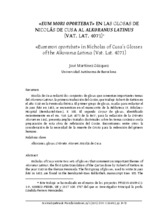"Eum mori oportebat" in Nicholas of Cusa’s Glosses of the Alkoranus Latinus (Vat Lat. 4071)
Autor
Martínez Gázquez, José
Editor
UCOPressFecha
2019Materia
AlkoranusGlosas
Cribratio Alkorani
Nicolás de Cusa
Glosses
Nicholas of Cusa
METS:
Mostrar el registro METSPREMIS:
Mostrar el registro PREMISMetadatos
Mostrar el registro completo del ítemResumen
Nicolás de Cusa redactó dos conjuntos de glosas que comentan importantes temas del Alkoranus Latinus, la primera traducción del Corán, que tradujo Robert de Ketton en el año 1143 en la Península Ibérica. El primer grupo de glosas, usadas para redactar el De pace fidei en 1453,se encuentran en el manuscrito de la Biblioteca St. Nikolaus-Hospital (Bernkastel-Kues), K 108. El segundo Corpus de glosas, identificado recientemente en el ms. Vat. Lat. 4071 de la BAV, para la redacción de la Cribratio Alkorani en 1462, presenta amplios tratados doctrinales sobre les temas coránicos en la preparación de esta obra de refutación del Corán. Encontramos entre otros la consideración de la necesidad de la muerte de Cristo para la redención del género humano. Nicholas of Cusa wrote two sets of glosses that comment on important themes of Alkoranus Latinus, the first Latin translation of the Qur'an done by Robert of Ketton in the year 1143 in the Iberian Peninsula. The first group of glosses, used to write De pace fidei in 1453, are found in the Bernkastel-Kues Bibliothek, manuscript Kues 108. The second set of glosses, recently identified in manuscript 4071 of the Vatican Library, and used to write Cribratio Alkorani in 1462, presents extensive doctrinal treatises onQuranic subjects. We find, among others, the consideration of the necessity of the death of Christ for the redemption of the human race

